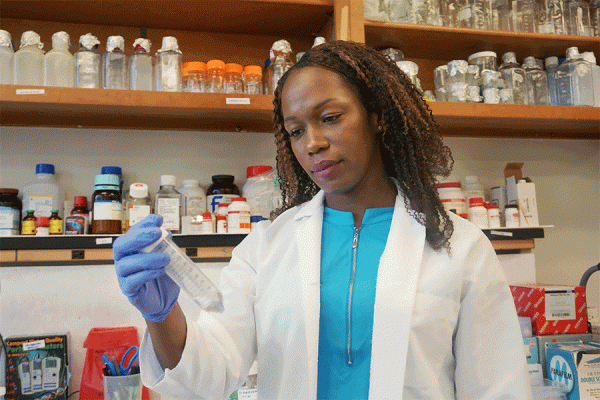A cluster of small businesses located directly on a university campus is not at all common. However, a growing number of research-oriented businesses are calling the University of New Orleans home.
Since 2017, the University of New Orleans Advanced Materials Research Institute (AMRI) has been leasing space to small businesses in the Science Building on the University’s campus.
Attracted by quality lab and office facilities, faculty collaborations, readily available undergraduate and graduate interns and a pipeline to new graduates, eight companies are currently housed at UNO.
The companies—InnoGenomics, Obatala Sciences, Model Content, Bastian Enterprises, Stadius BioPharma, Golden Leaf Energy, TMS BioScience and Cell Free Systems—have varied interests including biotechnology, green materials, medicine, forensics, marketing and chemical analysis.
The companies have over 30 employees on the UNO campus, including four UNO graduates.
These tenants are finding UNO an effective part of their development and sustainability, said John B. Wiley, director of AMRI and a chemistry professor.
“We have a unique environment here,” Wiley said. “While many of the outcomes can be anticipated, what is especially exciting is the potential for new developments, new collaborations and new ideas that will impact education, research and business.”
The proximity and strong relationships between the companies and AMRI are leading to other positive results. Some AMRI faculty are starting their own businesses and AMRI tenants are more than willing to help faculty negotiate the path to developing a successful startup, Wiley said.
In terms of education, AMRI faculty members were recently able to secure more than $400,000 from the National Science Foundation (NSF) for undergraduate research. This program, starting summer of 2022, includes one- and two-day internships in AMRI companies, providing undergraduates with important exposure to small business.
It was clear from the NSF proposal reviews that the inclusion of student industrial internships were a major highlight of the proposal, one that would not have been possible without the proximity of the various companies, Wiley said.
UNO’s hosting of small businesses has proceeded in a slow, organic fashion, Wiley said.
The first business to rent space at UNO was Advano, a company specializing in the development of silicon nanomaterials that increases the energy and power of rechargeable, lithium-ion batteries.
Advano started in AMRI in the spring of 2017 with 650 square feet of lab space and four employees, but grew quickly to over 4,000 square feet and 20 employees. In the spring of 2020, the need for expansion to support their processing efforts led to a move to the UNO Research and Technology Park, where the company, valued at $50 million, now has 30 employees and over 15,000 square feet of lab and office space.
“The support from AMRI and UNO has been and remains extremely critical to our success,” Advano’s CEO and co-founder Shiva Adireddy said. “The staff at AMRI readily gave us access to equipment and space at crucial times in our development; we thrived in AMRI."
The synergy between AMRI tenants has also been meaningful for UNO faculty and students, Wiley said.
Damon Smith, an assistant professor in mechanical engineering, has ongoing projects involving 3-D printing with two biotech companies, InnoGenomics and Obatala Sciences.
Meanwhile, Viktor Poltavets, assistant professor in chemistry, has been working with Advano, which has led to a contract for characterization of spent batteries and a collaborative Louisiana Board of Regents industrial ties grant. The two funding sources have a combined worth of more than $640,000.
“The connection with Advano and their battery expertise has helped accelerate the development of my own battery program in sodium molten salt batteries,” Poltavets said. “The initial proximity of my labs and theirs readily catalyzed our collaboration.”
Internships with the various companies also have been very beneficial for UNO students. These provide not only hands-on research experience in applied technologies, but also expose the students to a small business’ day-to-day operations, Wiley said.
UNO student Madison Fisher, a chemistry major, has interned for two semesters with InnoGenomics, a small business working on DNA test kits for both medical and forensic applications.
InnoGenomics products have helped to decrease the extensive backlog of rape test kits in crime labs across the country.
Fisher’s project involved advancing DNA analysis for follicle-less hair strands.
“I had the best time with this research and learned so much from everyone at the company,” Fisher said. “Everyone was ready and willing to teach me something new or answer any questions I had about the project, company, or related research.”
Fisher said the convenience of interning at a company located on campus was an added bonus.
“Having the company, classrooms and professors all in the same building was great. This made the internship that much better,” Fisher said. “Rather than spending time traveling between campus and another facility, I was able to get more hours in the lab before, between or after classes.”
Beyond internships, the companies also have hired several UNO graduates into full and part-time positions since locating on the UNO campus.
Currently, four UNO graduates are working full-time in key positions for on-campus companies and Advano, Wiley said.
Much of the revenue from space and equipment rental from the companies is used to offset AMRI operational costs, especially towards the support of expensive service contracts for major materials analysis instrumentation, such as electron microscopes. Money also is spent on additions and renovations to the Science Building.
So far, AMRI has installed a backup generator to better secure key equipment during power outages and has renovated several offices and labs. AMRI is currently considering additional backup power and further renovations to make room for other small businesses, Wiley said.
“We want the companies to be successful,” Wiley said. “It is good for AMRI, UNO and the Louisiana economy that they succeed.”





